外研版(2019)必修第三册Unit 1 Knowing Me, Knowing You Listening and speaking课件(共19张PPT,内镶嵌音频)
文档属性
| 名称 | 外研版(2019)必修第三册Unit 1 Knowing Me, Knowing You Listening and speaking课件(共19张PPT,内镶嵌音频) | 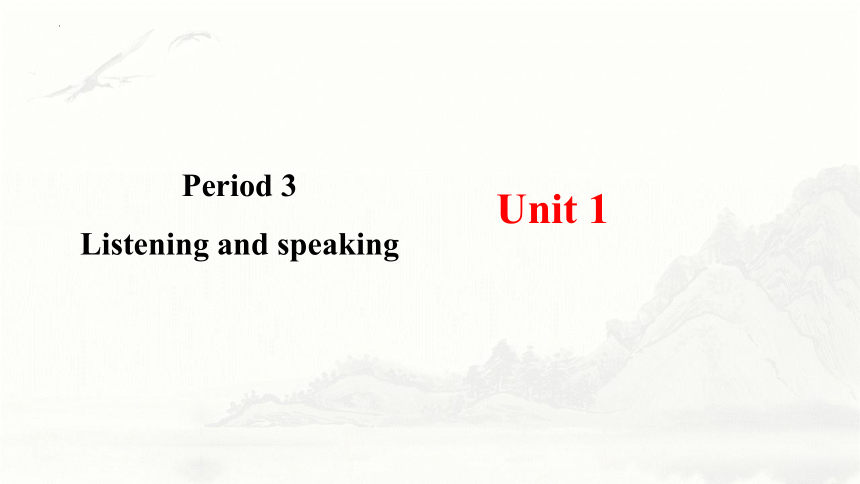 | |
| 格式 | pptx | ||
| 文件大小 | 5.9MB | ||
| 资源类型 | 教案 | ||
| 版本资源 | 外研版(2019) | ||
| 科目 | 英语 | ||
| 更新时间 | 2024-01-14 22:32:03 | ||
图片预览

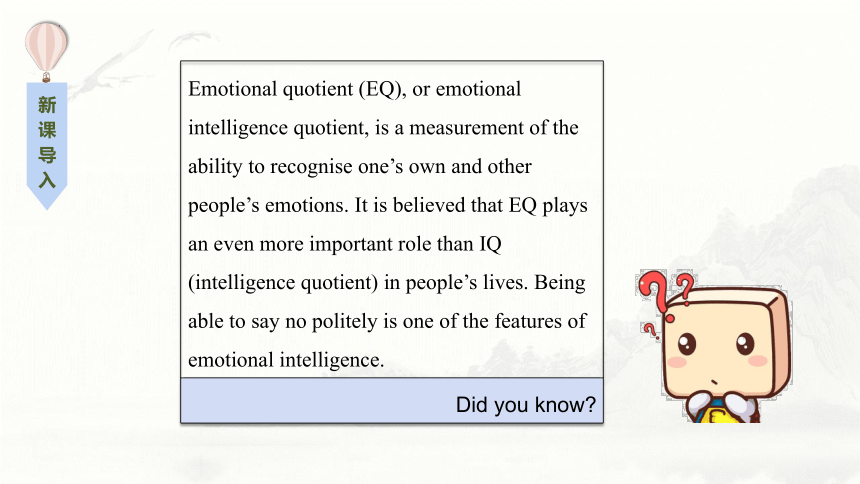
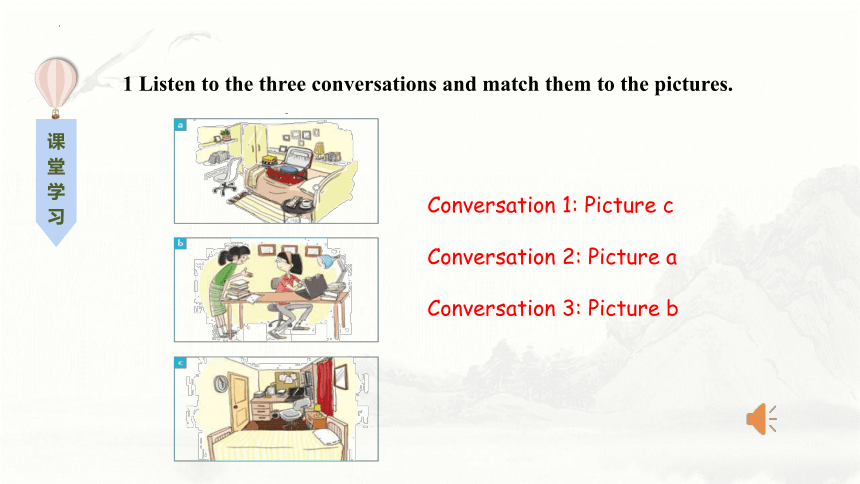
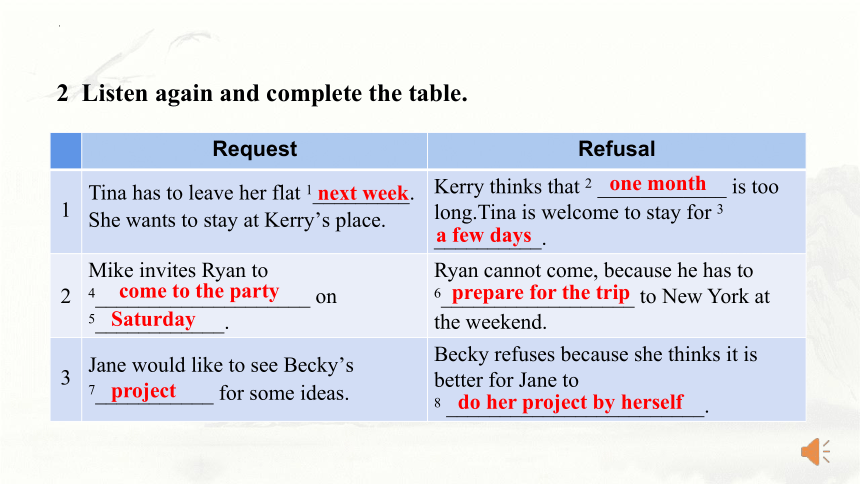
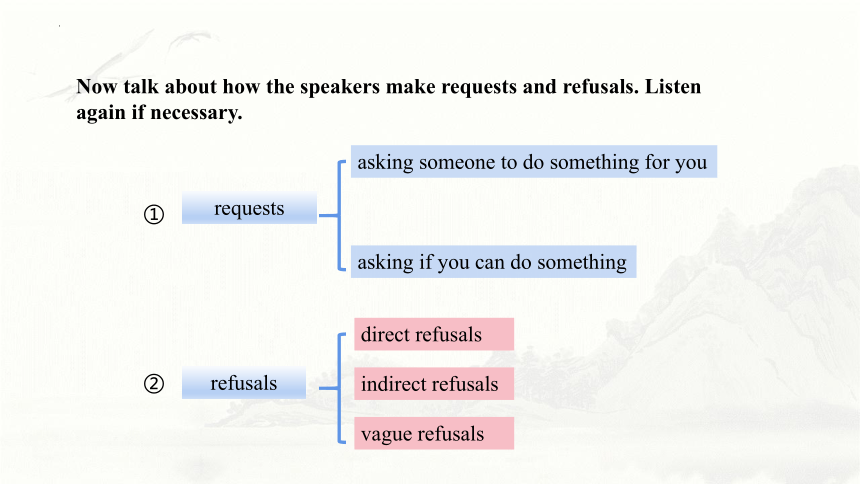
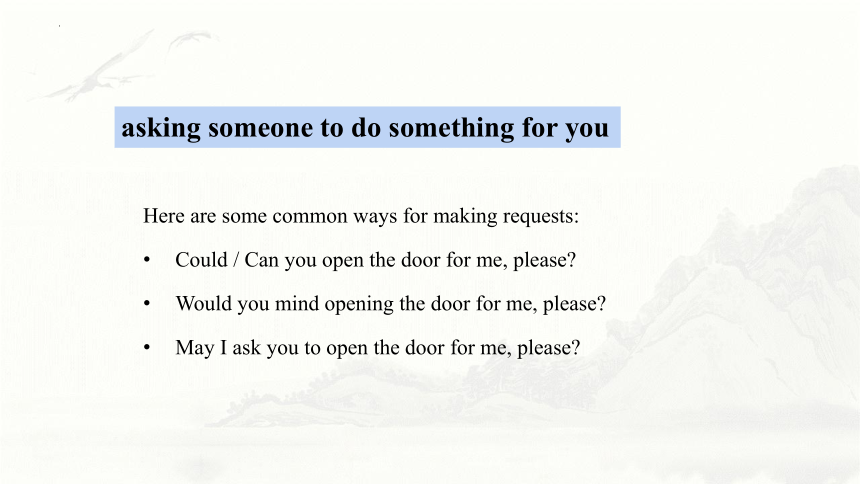
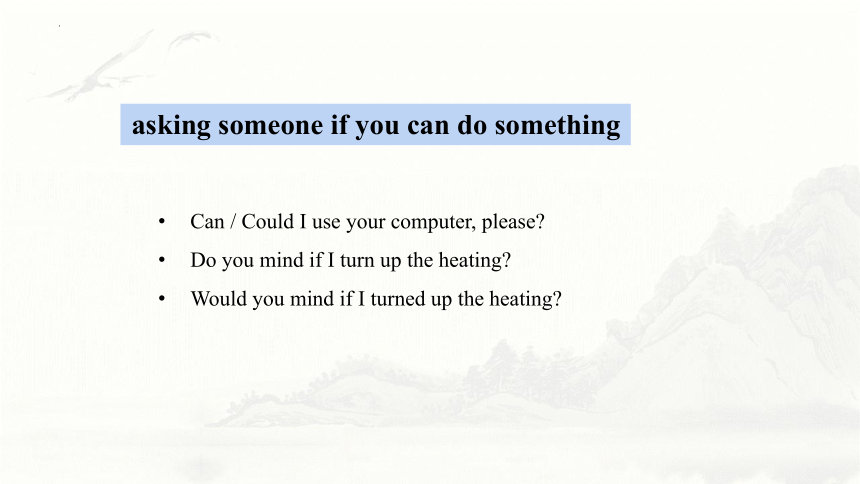
文档简介
(共19张PPT)
Unit 1
Period 3
Listening and speaking
新 课 导 入
Emotional quotient (EQ), or emotional intelligence quotient, is a measurement of the ability to recognise one’s own and other people’s emotions. It is believed that EQ plays an even more important role than IQ (intelligence quotient) in people’s lives. Being able to say no politely is one of the features of emotional intelligence.
Did you know
课 堂 学 习
1 Listen to the three conversations and match them to the pictures.
Conversation 1: Picture c
Conversation 2: Picture a
Conversation 3: Picture b
Request Refusal
1 Tina has to leave her flat 1_________. She wants to stay at Kerry’s place. Kerry thinks that 2 ____________ is too long.Tina is welcome to stay for 3 __________.
2 Mike invites Ryan to 4____________________ on 5____________. Ryan cannot come, because he has to 6__________________ to New York at the weekend.
3 Jane would like to see Becky’s 7___________ for some ideas. Becky refuses because she thinks it is better for Jane to
8 ________________________.
project
one month
a few days
come to the party
Saturday
prepare for the trip
next week
do her project by herself
2 Listen again and complete the table.
Now talk about how the speakers make requests and refusals. Listen again if necessary.
requests
asking someone to do something for you
asking if you can do something
①
②
refusals
direct refusals
indirect refusals
vague refusals
Here are some common ways for making requests:
Could / Can you open the door for me, please
Would you mind opening the door for me, please
May I ask you to open the door for me, please
asking someone to do something for you
Can / Could I use your computer, please
Do you mind if I turn up the heating
Would you mind if I turned up the heating
asking someone if you can do something
direct refusals
A: Can I borrow some money from you
B: Sorry, you can’t.
A: I’m attracted by you. What about you
B: Sorry, I’m not interested in you at all.
indirect refusals
A: Do you want to join us to watch movies
B: Yes, I’d like to, but I need to finish my homework today.
A: I’m attracted by you. What about you
B: Thank you for your favor, but maybe we are not suitable for each other.
vague refusals
A: Can you lend me some money
B: Er… Well, it depends on my wife’s mood.
A: I’m attracted by you. What about you
B: Aha… you must be joking… Oh, I nearly forget to tell you that I’ve just watched an interesting movies.
Conversation 1
Tina: Hi Kerry, have you got a minute
Kerry: Yeah, sure, Tina. What’s up
Tina: Well, the thing is, I’ve got to leave my flat next week, but my new place won’t be ready until next month. Could I stay at your place for a while
Kerry: You mean for a couple of days
Tina: Er... not exactly. For a month.
Kerry: A month I’m afraid one month is just too long.
Tina: Oh, come on, please...
Kerry: I’m sorry, but my room is just too small for two people. You’re welcome to stay for a few days, though.
Conversation 2
Mike: Hello Ryan! Just the person I wanted to see!
Ryan: Hi Mike. How’s it going
Mike: I’m having a party at my house on Saturday. You’ll come, won’t you
Ryan: On Saturday I’d love to, but I’m visiting my cousin in New York on Monday, and I have to spend the weekend preparing for the trip.
Mike: That’s too bad. I’m sorry you’ll miss it.
Ryan: Yes, I’m sorry, too. Next time, OK
Conversation 3
Jane: Becky, have you done your project yet
Becky: Hi Jane. You mean the one that’s due tomorrow
Jane: Yes, that’s the one
Becky: Of course I have. Haven’t you finished yours yet
Jane: No, I haven’t. The thing is, I’ve been really busy and... Well, I was just wondering if you could let me see your project, just to give me some ideas, you know...
Becky: I’m not sure... It would be better to do your project by yourself.
Jane: I promise I won’t copy it or anything like that.
Becky: I’m sorry, Jane, it just doesn’t feel right. I’d be happy to talk about your project with you, though, if you need my help.
Learning to learn
If you have to say no to a request, your refusal will sound more polite if you begin with a statement of regret, such as I’m sorry…, I’d really like to, but…. Then explain why your answer is no, eg I’m really busy right now. If possible, suggest an alternative – How about next week
3 Work in pairs. Act out the conversation about asking for a favour and refusing politely.
Student A:
You will go on a trip with your family for two weeks and you would like to ask Student B to take care of your pet cat. Explain to him / her:
You’d like to send your pet cat to his / her flat to stay for two weeks.
Your cat is well-behaved and won’t make any trouble.
You will treat him / her to dinner when you come back.
Useful expressions
Have you got a minute
Hello...! Just the person I wanted to see.
Well, the thing is...
I was just wondering if you could...
I promise...
Oh, come on, please...
Student B:
Student A would like you to do him / her a favour. You have to refuse politely. Explain to him / her:
You don’t want your room to be messy.
Your parents won’t allow it.
You know another classmate who likes cats and maybe he / she would like to help.
Useful expressions
What’s up
Oh, you mean...
I’m afraid...
I’m sorry, but...
I think it would be better to...
But maybe...
A: Good morning, Tom! Have you got a minute
B: Hi! Kate, what’s up
A: Huh, I will go on a trip with my family for two weeks, but I can’t bring my pet cat together with us. I’m wondering if you could take care of it while we are away
B: Yeah. Oh, you mean that I will be its owner I’m sorry, but I have never looked after any pets.
A: Don’t worry! I promise my cat is well-behaved and won’t make any trouble.
B: En, let me see! Maybe I have to ask my parents who won’t allow me to keep pet.
A: OK. I promise I will treat you to dinner after I come back. Just help me. I beg you.
B: well, I really want to help you. I know another classmate who likes cats and maybe he would like to help. I will contact him immediately.
A: Really That’s really good. Thank you so much.
B: You are welcome. I wish you have a nice trip with your family.
Possible version:
4 Work in pairs. Think of another situation and have a similar conversation.
Retell some expressions to express no politely.
Unit 1
Period 3
Listening and speaking
新 课 导 入
Emotional quotient (EQ), or emotional intelligence quotient, is a measurement of the ability to recognise one’s own and other people’s emotions. It is believed that EQ plays an even more important role than IQ (intelligence quotient) in people’s lives. Being able to say no politely is one of the features of emotional intelligence.
Did you know
课 堂 学 习
1 Listen to the three conversations and match them to the pictures.
Conversation 1: Picture c
Conversation 2: Picture a
Conversation 3: Picture b
Request Refusal
1 Tina has to leave her flat 1_________. She wants to stay at Kerry’s place. Kerry thinks that 2 ____________ is too long.Tina is welcome to stay for 3 __________.
2 Mike invites Ryan to 4____________________ on 5____________. Ryan cannot come, because he has to 6__________________ to New York at the weekend.
3 Jane would like to see Becky’s 7___________ for some ideas. Becky refuses because she thinks it is better for Jane to
8 ________________________.
project
one month
a few days
come to the party
Saturday
prepare for the trip
next week
do her project by herself
2 Listen again and complete the table.
Now talk about how the speakers make requests and refusals. Listen again if necessary.
requests
asking someone to do something for you
asking if you can do something
①
②
refusals
direct refusals
indirect refusals
vague refusals
Here are some common ways for making requests:
Could / Can you open the door for me, please
Would you mind opening the door for me, please
May I ask you to open the door for me, please
asking someone to do something for you
Can / Could I use your computer, please
Do you mind if I turn up the heating
Would you mind if I turned up the heating
asking someone if you can do something
direct refusals
A: Can I borrow some money from you
B: Sorry, you can’t.
A: I’m attracted by you. What about you
B: Sorry, I’m not interested in you at all.
indirect refusals
A: Do you want to join us to watch movies
B: Yes, I’d like to, but I need to finish my homework today.
A: I’m attracted by you. What about you
B: Thank you for your favor, but maybe we are not suitable for each other.
vague refusals
A: Can you lend me some money
B: Er… Well, it depends on my wife’s mood.
A: I’m attracted by you. What about you
B: Aha… you must be joking… Oh, I nearly forget to tell you that I’ve just watched an interesting movies.
Conversation 1
Tina: Hi Kerry, have you got a minute
Kerry: Yeah, sure, Tina. What’s up
Tina: Well, the thing is, I’ve got to leave my flat next week, but my new place won’t be ready until next month. Could I stay at your place for a while
Kerry: You mean for a couple of days
Tina: Er... not exactly. For a month.
Kerry: A month I’m afraid one month is just too long.
Tina: Oh, come on, please...
Kerry: I’m sorry, but my room is just too small for two people. You’re welcome to stay for a few days, though.
Conversation 2
Mike: Hello Ryan! Just the person I wanted to see!
Ryan: Hi Mike. How’s it going
Mike: I’m having a party at my house on Saturday. You’ll come, won’t you
Ryan: On Saturday I’d love to, but I’m visiting my cousin in New York on Monday, and I have to spend the weekend preparing for the trip.
Mike: That’s too bad. I’m sorry you’ll miss it.
Ryan: Yes, I’m sorry, too. Next time, OK
Conversation 3
Jane: Becky, have you done your project yet
Becky: Hi Jane. You mean the one that’s due tomorrow
Jane: Yes, that’s the one
Becky: Of course I have. Haven’t you finished yours yet
Jane: No, I haven’t. The thing is, I’ve been really busy and... Well, I was just wondering if you could let me see your project, just to give me some ideas, you know...
Becky: I’m not sure... It would be better to do your project by yourself.
Jane: I promise I won’t copy it or anything like that.
Becky: I’m sorry, Jane, it just doesn’t feel right. I’d be happy to talk about your project with you, though, if you need my help.
Learning to learn
If you have to say no to a request, your refusal will sound more polite if you begin with a statement of regret, such as I’m sorry…, I’d really like to, but…. Then explain why your answer is no, eg I’m really busy right now. If possible, suggest an alternative – How about next week
3 Work in pairs. Act out the conversation about asking for a favour and refusing politely.
Student A:
You will go on a trip with your family for two weeks and you would like to ask Student B to take care of your pet cat. Explain to him / her:
You’d like to send your pet cat to his / her flat to stay for two weeks.
Your cat is well-behaved and won’t make any trouble.
You will treat him / her to dinner when you come back.
Useful expressions
Have you got a minute
Hello...! Just the person I wanted to see.
Well, the thing is...
I was just wondering if you could...
I promise...
Oh, come on, please...
Student B:
Student A would like you to do him / her a favour. You have to refuse politely. Explain to him / her:
You don’t want your room to be messy.
Your parents won’t allow it.
You know another classmate who likes cats and maybe he / she would like to help.
Useful expressions
What’s up
Oh, you mean...
I’m afraid...
I’m sorry, but...
I think it would be better to...
But maybe...
A: Good morning, Tom! Have you got a minute
B: Hi! Kate, what’s up
A: Huh, I will go on a trip with my family for two weeks, but I can’t bring my pet cat together with us. I’m wondering if you could take care of it while we are away
B: Yeah. Oh, you mean that I will be its owner I’m sorry, but I have never looked after any pets.
A: Don’t worry! I promise my cat is well-behaved and won’t make any trouble.
B: En, let me see! Maybe I have to ask my parents who won’t allow me to keep pet.
A: OK. I promise I will treat you to dinner after I come back. Just help me. I beg you.
B: well, I really want to help you. I know another classmate who likes cats and maybe he would like to help. I will contact him immediately.
A: Really That’s really good. Thank you so much.
B: You are welcome. I wish you have a nice trip with your family.
Possible version:
4 Work in pairs. Think of another situation and have a similar conversation.
Retell some expressions to express no politely.
